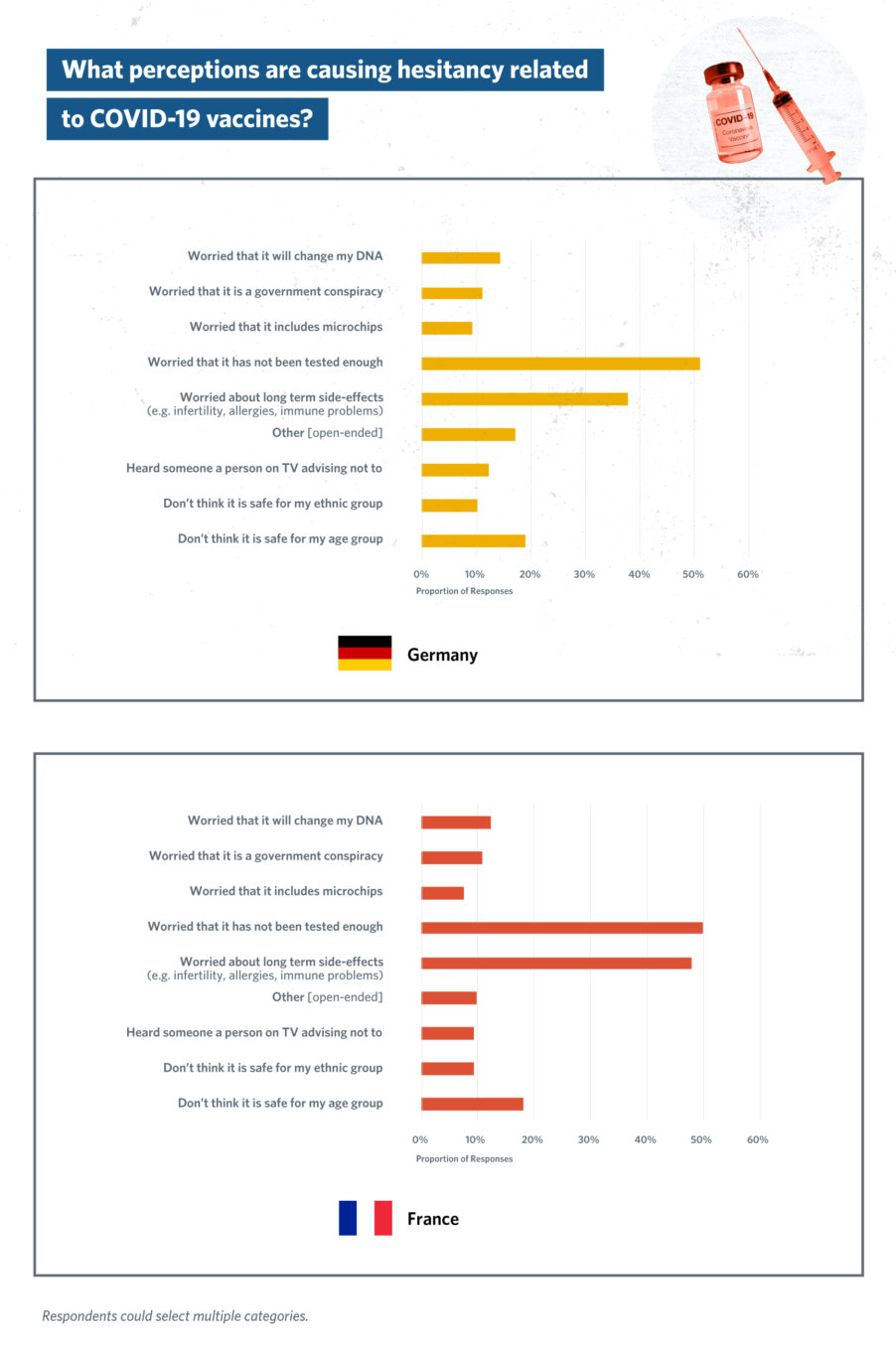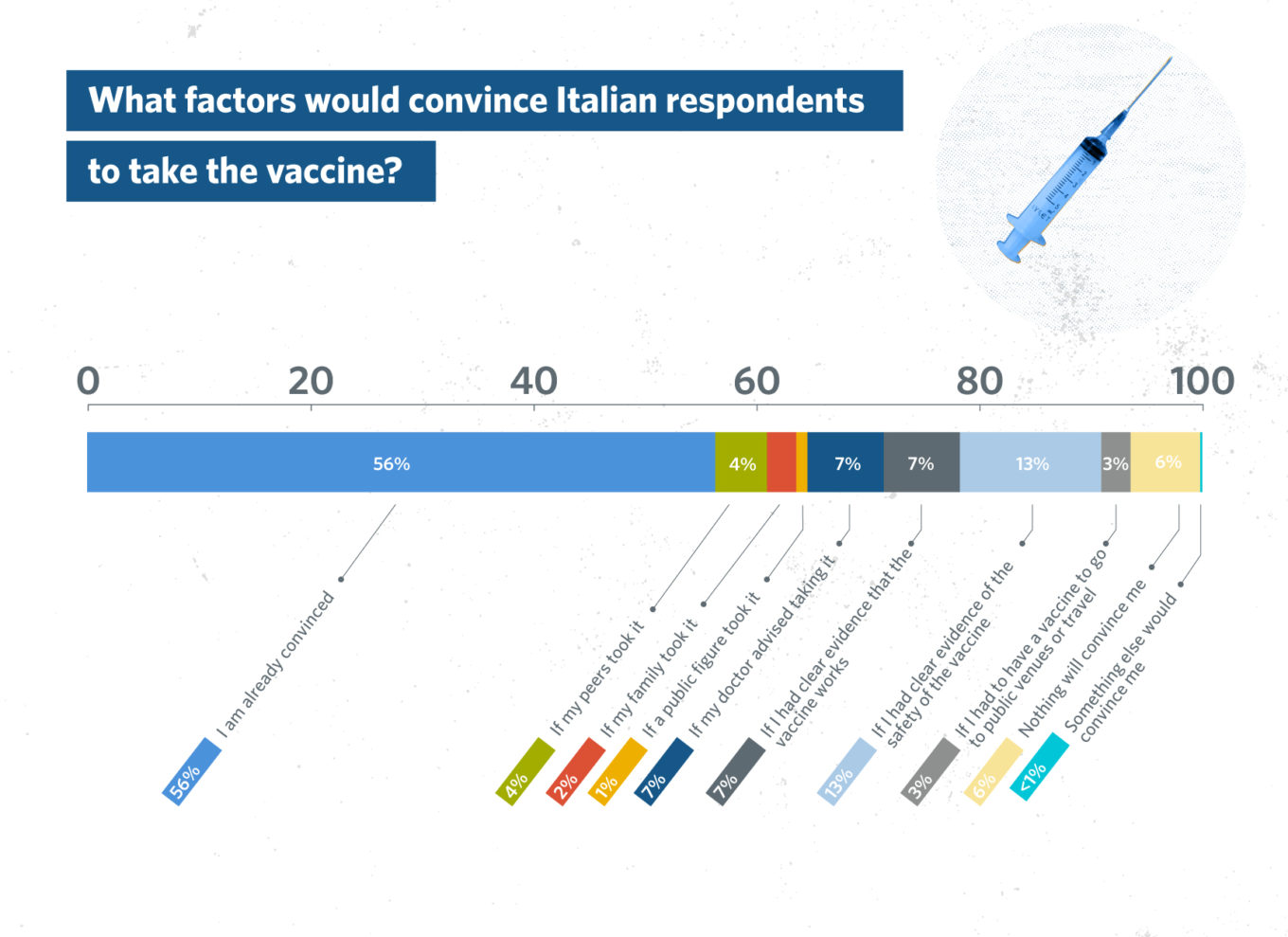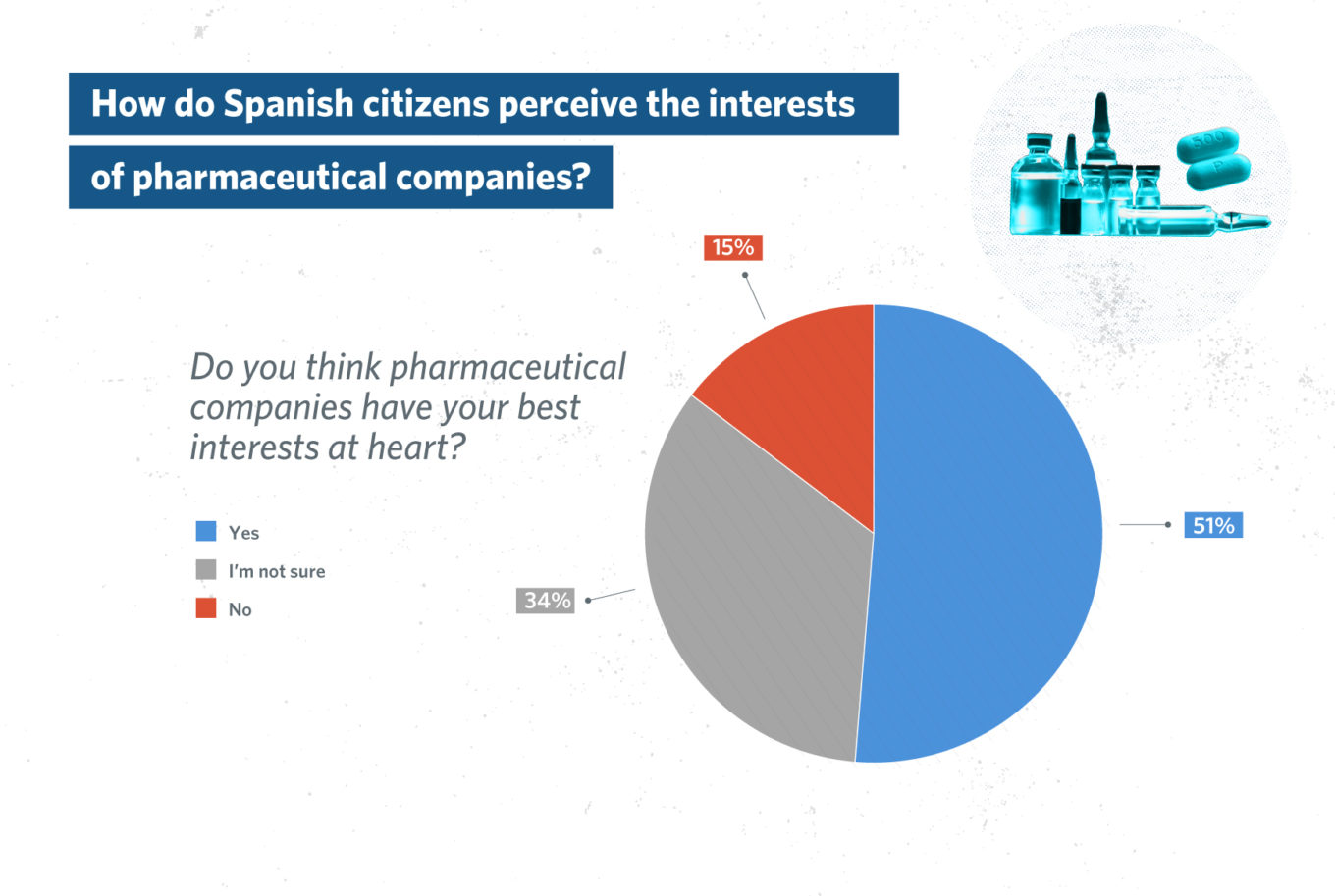Vaccine information: many Europeans trust local doctors over national governments
Measuring vaccine confidence in Europe: Exclusive FleishmanHillard research reveals trends in four European markets
As vaccination plans are being rolled out across the European Union, it’s important to understand what sources of vaccine information Europeans trust when it comes to COVID-19.
To understand the trends in misinformation and identify opportunities to deliver science-based vaccine information, FleishmanHillard Brussels partnered with our in-house research and measurement group, TRUE Global Intelligence, to conduct a survey in four key European markets (France, Germany, Spain and Italy*) comparing the national nuances of public sentiment.
Europeans widely trust the same vaccine information sources
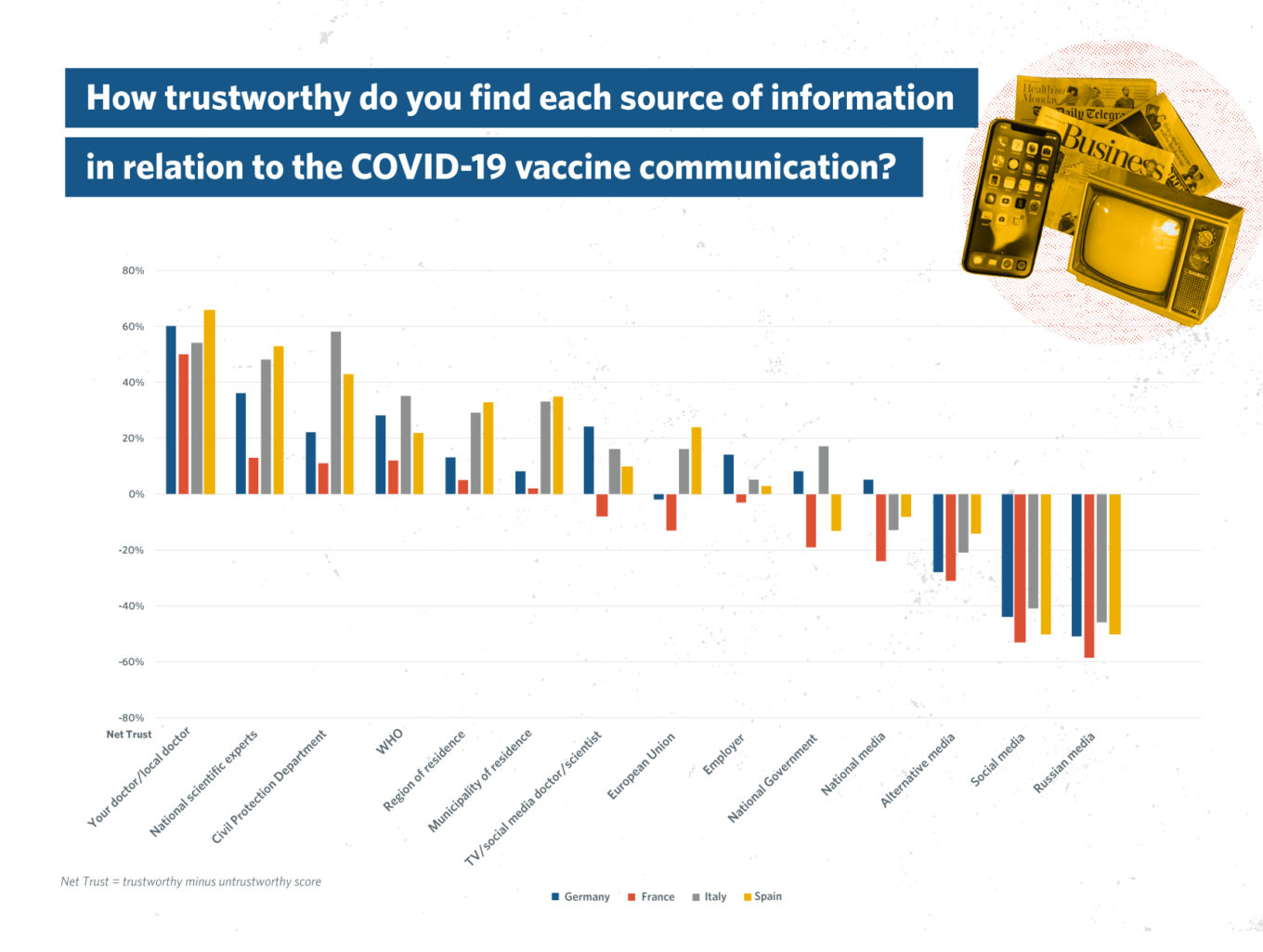
This is a list of common sources of information relating to the COVID-19 pandemic and vaccines, collected from our desk research.
With slight deviation occurring by market, our findings indicate Europeans largely trust the same sources of information. Across all markets, personal and local doctors received the highest level of net trust with national scientific experts coming in second. When it comes to the lowest score of net trust, social media and Russian media ranked last in all markets. Another trend to note is that French respondents appear to be the least trusting of the four markets, expressing the lowest level of trust across all vaccine information sources.
There are two sources of vaccine information with polarised results across markets: national governments and the European Union. For example, in Spain there is a high level of net trust for the EU while the national government has received a negative score. In Germany this is the opposite: higher net trust in the national government is met with a negative figure for the European Union. Italy and France are all-in: the level of trust is negative in France for both the national government and the European Union, whilst Italy has a positive level of trust for both institutions. In all markets except for Italy, respondents indicated more trust for their employers than they did for national institutions.
Trust has changed between waves of the pandemic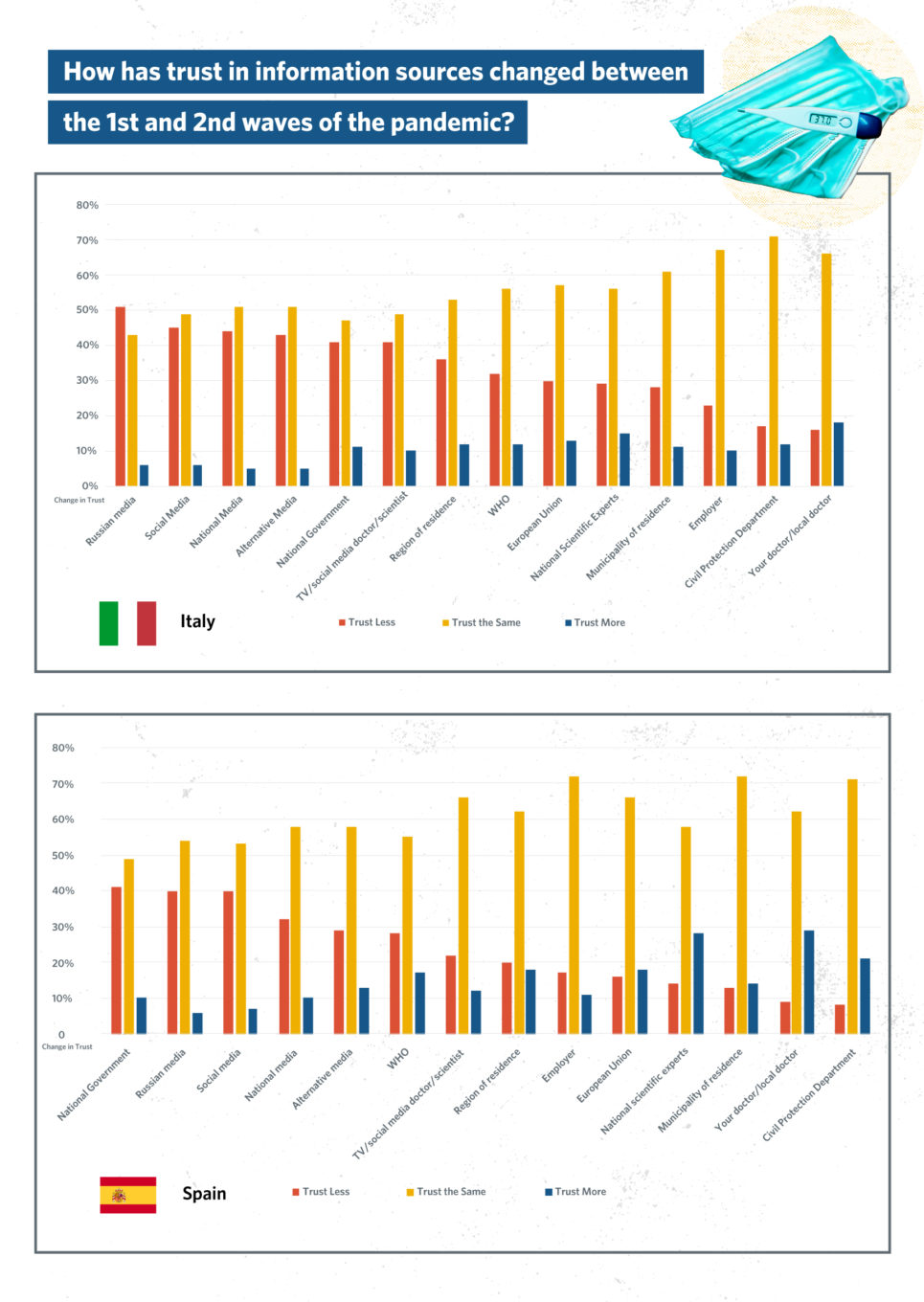
Our findings suggest there has been a loss of trust for nearly all vaccine information sources between the first and second waves of the pandemic, slightly more marked in Italy than in Spain. This decrease can largely be attributed to the general pandemic situation which has unsettled society, making citizens more risk-averse and cautious when it comes to trusting information sources. While the perceived successes and failures in responding to the crisis has undoubtedly resulted in a significant loss of trust for national governments in both markets, an increase in trust for local doctors occurred in both markets.
Reasons behind vaccine hesitancy
While trust in information sources may vary slightly between markets, reasons for vaccine hesitancy remain largely the same, centring on concerns related to a perceived lack of testing and long-term side effects in two key markets.
When presented with a multi-choice lists of reasons why they may be hesitant to take the vaccine, respondents in France and Germany identified concerns over how much the vaccine had been tested (safety and efficacy), followed closely by concerns related to potential long-term side-effects. In both markets, at least 10% of respondents indicated they believed the vaccine was a government conspiracy.
Can citizens be persuaded to take the vaccine?
While understanding what drives trust and distrust, it’s also key to identify potential avenues by which vaccine confidence can be promoted.
While 56% of Italian respondents expressed confidence in vaccines, 44% indicated they needed further convincing before receiving the jab. Aside from the 6% of respondents who indicated nothing could change their mind, all respondents remain open to taking the vaccine should they be presented with evidence of efficacy (7%) and safety (13%) or a number of other practical and relational reasons (i.e. to travel or if an individual’s family/peers took it).
Perceptions of pharmaceutical companies
Our research also found that levels of trust in vaccines could be related to the perceptions citizens hold regarding pharmaceutical companies.
In Spain, only a slim majority of citizens believe pharmaceutical companies have their best interests at heart. As societies are reliant on pharmaceutical solutions for a way out of the current crisis, there is significant opportunity for pharmaceutical companies to increase trust amongst citizens through the delivery of safe and effective vaccines in the months ahead.
The relation between trust and vaccine uptake
To understand the common threads and stark differences of the dynamics behind national confidence in vaccines, our team will dive into this data country by country. One thing is certain, the success of European vaccination strategies will be heavily dependent on on citizens’ uptake. Therefore, all contributing factors affecting and impacting confidence in vaccines must be taken into consideration as we look to the future.
While our research is focused on the current health crisis, the lessons will outlast the progression of COVID-19 into a managed endemic. Vaccines are a crucial tool for public health which prevent and, in some cases, eradicate fatal diseases. As humanity is and will remain dependent on vaccination efforts, learning how to dispel myths and encourage uptake will remain an essential tool for public health.
Stay tuned as our team dives in!
*Sample size for survey by market: France 438, Germany 427, Italy 497, Spain 423
-

Haven is a policy and political outreach specialist who supports clients in health sectors by directing engagement with Brussels stakeholders. Prior to joining FleishmanHillard, she worked as head of office for a Member of the European Parliament on two committees: Environment, Public Health and Food...
Find Out More
-
Generative AI is changing the search game
May 8, 2025
-
The challenges facing Europe and European leaders at Davos 2025
January 24, 2025
